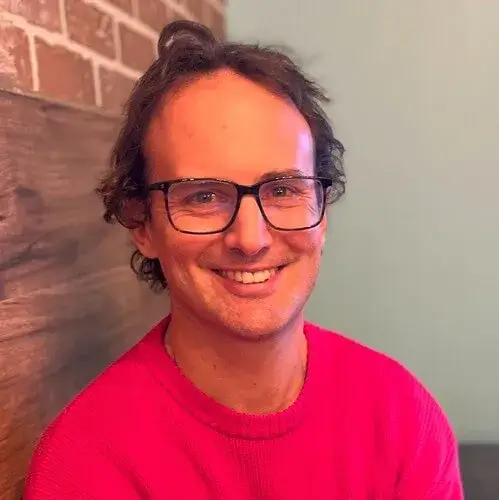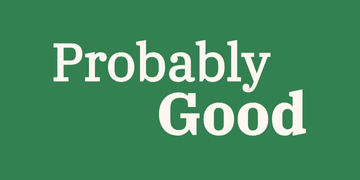
“There are some really interesting parts of operations work that I do. But I think people need to be very aware that no matter who you are, there’s gonna be a significant chunk of time doing things that aren’t interesting. Then you need to be able to grab onto the organization’s impact and mission to find meaning in your work.”
Bell Arden currently runs the Operations team at The Future Society, a non-profit organization focused on improving AI governance. Bell has a unique trajectory, including eighteen years in construction engineering, a five-year stint on a bicycle in sub-Saharan Africa, and a mid-career pivot to managing the day-to-day operations of a nonprofit. They recently chatted with us about their career journey, experience working in operations, and thoughts on social impact. The conversation has been edited for clarity and brevity.
When you think back on your younger self, how did your thinking around your career change over time?
I grew up in South Africa, and back then, there was kind of just one path: you must go to university and you must pick the most advanced degree you can do. I had no premise for an “impact-focused career.” It just wasn’t something that existed in my mind. So I studied engineering and worked as a construction engineer for eighteen years.
About a decade into my career, I began to feel a sense of distance from my work. I fell into veganism at some point which helped me realize there were big issues in the world that really mattered. It sounds weird that I didn’t really think about the world’s issues before, but I was kind of just going along with my life. I was having fun mountain biking and being an engineer.
Around that time, someone gave me a book about how to travel and live on a bicycle. I thought, ‘Wow you can actually do that. You can just go and you don’t have to have a big plan.’ I wasn’t really sure what I was doing. I had the means to work remotely with my job. So I thought it was a good time to just go out and explore.
I ended up spending about 5 years on a bicycle traveling around sub-Saharan Africa and parts of the developing world. This completely changed my perspective on how the world works and what life looks like for most people. Suddenly my job of building interesting buildings for mostly wealthy people became really aversive to me. I know it’s a pretty niche way to get to this point, but the whole experience dramatically shifted how I thought about my career and life.
So if this experience made you want to do something more focused on improving the world, how did you get to your current work?
In sub-Saharan Africa specifically, development work can be pretty fraught. There are blindingly obvious issues with aid and just building orphanages as a solution to everything. I started to ask, why is it done this way? Are there better ways of doing this? I saw a lot of suffering, and I wanted to know what some wise people were thinking about all this.
This eventually led me to discover effective altruism [a social movement focused on figuring out how to help others most effectively]. Through ‘EA,’ I started to learn about and explore different cause areas I might want to work on. When I learned more about the cause area global catastrophic risks, it strongly resonated with me. This is what led me to eventually work in AI governance in my current role.
However, even within my team at TFS, I hold the position that we should work in this space (AI safety) knowing with a heavy heart what we’re not working on in other cause areas. I don’t think this happens enough within the Effective Altruism community. I think it’s really important to work in a cause area that interests you and that you find meaning in—along with some humility around whether or not it’s the most impactful thing you could do.
A lot of people think AI governance is the most impactful thing to work on because the numbers say so. But this is kind of saying we should just resign X million people to poverty because we’re just going to decide to focus on this. To my understanding, this is what cause neutrality is all about. There are a myriad number of important causes. People may say ‘the numbers say this,’ but it’s more than that. If you were actually out there in the world, you’d understand that expected value calculations are not quite the whole picture.
Thinking about your previous experience in engineering, what helped prepare you for your work now?
I think for me it felt like I really needed extensive volunteer experience to really operate in the application space for high-impact roles. I wasn’t getting any traction initially. I was fortunate to be able to quit my job and spend several months volunteering in effective altruism organizations, but I think that’s a pretty high bar for people coming from different fields.
There are quite a lot of differences between the nonprofit world and corporate world, but I don’t think they should be as big of barriers as they are—especially in operations roles. What I do now isn’t specific to nonprofits. HR policy is very much similar to HR policy in any company.
But I do think this idea of getting experience outside the “high-impact” nonprofit world is really valid and pretty helpful. A lot of skills are transferable. For me, 18 years of extensive project management work—along with running a small business in the construction industry half of that time—was really applicable to running operations for a nonprofit. A lot of construction is complex projects that require organizational skills. I now find that really helpful in organizing our organization and how we work.
If someone is already aware that they want to go into a high-impact career, I wouldn’t recommend my path. I’d recommend people invest in operations spaces in the for-profit space while trying to make themselves probably as much of a generalist as possible. I also think running a small business or being involved in a small company can be really helpful. It’s helpful to have the pragmatic mindset of keeping an organization or business running, keeping the lights on.
What do you spend most of your time doing? And what might be surprising to people about your work?
At The Future Society and other impact organizations, my impression is that we’re going through a process of professionalization and increasing standards. In the AI governance space, for example, it’s just absurdly competitive to get good staff members. Researchers can either go work for the big AI labs or come to us, which makes for pretty formidable competition budget-wise. We’re finding that we can compete for the best staff by being a truly great place to work. But being a great place to work requires being very professional in your policies and structures. It requires a good team culture.
So part of what I do every day is tackling these significant operations projects to professionalize the organization, attract talent, and allow us to scale up. One example is creating a management framework. Or creating a benchmarking compensation strategy that’s competitive and fair—with all the bells and whistles demanded by people being recruited. Or improving our recruiting system. For a while, I thought our recruiting system was pretty good. It turns out that the expectations are super high on how professional everything should be. The best candidates really do notice. If you want to get those ‘hell yes’ candidates, it really matters to have a professional recruiting system and a conversation strategy that makes sense.
The thing I think could be surprising to people is just how much of my time is spent on a myriad of small things. I get a ton of emails from all sorts of people, finance people, bank people, etc. There are a lot of things that need to tick over, and if they don’t happen, things crumble. I think people in operations need to be comfortable being the “doer of everything.”
I would say about 80% of my time is working on things that aren’t these big projects. A lot of my time is engagement with the team in meetings and 1-1’s. But it’s mostly keeping things running day-to-day, attending to the email factory and Slack, all sorts of small things. I think people might not expect that. People think operations is mostly building systems. And yes, I love building systems, it’s super exciting, but I only get to do that a little bit.
For me, this is where impact-focus comes in. A lot of things I do I find boring and I’m doing this because I care about our mission and the impact. There are some really interesting parts of operations work that I do. But I think people need to be very aware that no matter who you are, there’s gonna be a significant chunk of time doing things that aren’t interesting. Then you need to be able to grab onto the organization’s impact and mission to find meaning in your work.
Explore further
Want to figure out how to have more impact in your own career journey?
Check out these articles and resources.

